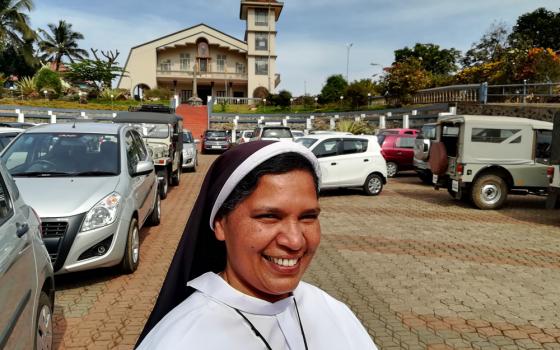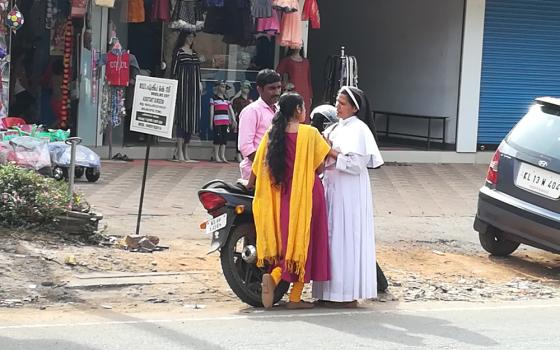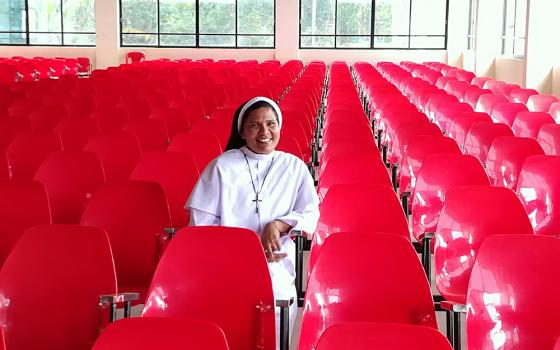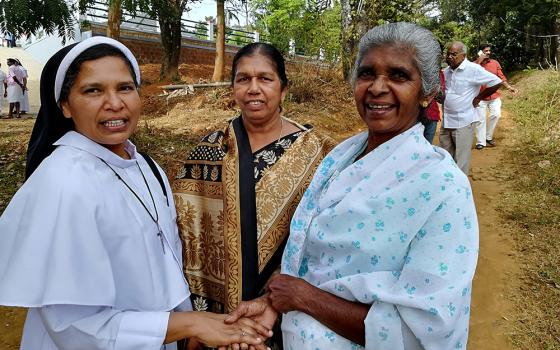The Franciscan Clarist Congregation, a 130-year-old indigenous congregation in India, two weeks ago dismissed Sr. Lucy Kalappura, a member, for violating the vows of poverty and obedience. It gave her 10 days to appeal to the Vatican against the order. She did so on Friday.
Kalappura says she was being punished for using media outlets to obtain justice for a nun who accused Bishop Franco Mulakkal of repeatedly raping her from 2014 to 2016 at her convent in Kuravilangad, south of Kochi. The Jalandhar bishop's trial date has not yet been set.
Kalappura, a 54-year-old schoolteacher, was a lesser known nun in India until September 2018, when she joined five members of the Missionaries of Jesus who staged a Kerala sit-in to support the rape survivor, their former superior general. The Missionaries of Jesus sisters have also been under church pressure for their activism.
Kalappura became a media sensation especially in Kerala, a major Christian center in southwestern India, when she questioned the church leaders' neglect of the survivor of alleged clergy abuse. Kalappura's superiors and other Catholic leaders reacted by accusing her of working with enemies of the church.
Her dismissal order, dated Aug. 5, says her congregation's general council on May 11 "unanimously voted to dismiss her" from the community. The Franciscan Clarists also obtained the assent of the prefect of the Congregation for the Oriental Churches for the council's decision.
Global Sisters Report interviewed her a few times since April this year when the congregation served her the third warning letter, offering her the option to leave the order on her own.
Kalappura describes the struggles with her superiors and church leaders that led to her dismissal.
GSR: Now that you are dismissed, what is your first reaction?
Kalappura: I am surprised. I don't think I have done anything against the rules of the congregation or the Catholic Church to deserve such an action. I have led a clear lifestyle with nothing to hide or fear.
What about the accusation that you have violated the vows of poverty and obedience?
It is not true. The accusations against me are that I learned to drive, got a driver's license, purchased a car with a loan, and published a book without permission. But I had done all this after the superiors continuously refused me permission, even after verbal and written requests. I did all this in good faith, thinking that sooner or later the congregation would understand me and accept my works. Unfortunately, I am proved wrong.
What is your next step?
They gave me 10 days to appeal against the dismissal to the prefect of the Congregation for the Oriental Churches at the Vatican. I have already appealed to the congregation. I will wait for its response to decide the future course of action.
Why is the congregation so determined to expel you?
My superiors are influenced by those jealous of my work among the poor and the needy. I am sad that I am criticized for doing good for other people. I have never deviated from my religious life at any point in time.
You have become quite popular on TV. How did that happen?
I have not done anything extraordinary to attract the media. It is true that I got a lot of media attention after I supported the five nuns who were forced to sit on a roadside seeking justice. I talked to the media for them. I used social media to highlight their plight. The church authorities, instead of helping the rape victim and her supporters, gave the accused bishop a clean bill. The media was interested in me because I was the only nun who openly challenged the bishops' stand.
You are primarily a schoolteacher. Why did you become a social activist?
I have been a mathematics teacher since 1993. But I spend my spare time to visit sick people at their homes, arrange for medicine and other help for those in need, and counsel people in distress.
I joined the convent with a desire to help suffering people. But my superiors asked me to take up teaching. However, my original desire was so strong that I started visiting families of my students. Such visits gradually became part of my daily routine as people began to share their struggles in family life and other issues. People also invited me to their homes. Soon I realized that counseling needed follow-up. I started seeking help from generous people for those in need. Thus I became a part-time social worker.
I have realized our physical presence not only makes people comfortable but boosts their confidence. I encourage them to attend spiritual retreats and family counseling. I liaise with government offices for them. I also counsel Catholic families who feel slighted by priests and nuns in their parish.
What was the response of your superiors and community members to such works?
The general attitude was negative. They taunted me for going out of the way to help people. Some were annoyed that I did not share the confidential details of my counseling.
You said outsiders support you. How do they do that?
They recognize my services. After the sit-in protest, the people of my present parish, on their own, pressured the parish priest to lift a ban on me from distributing Communion and teaching catechism in the Sunday school. The priest had to yield to the people's demand.
How many people have you helped so far?
I have touched so many people in my 33 years of consecrated life. I never took up any formal social work where records were kept. … Hundreds have benefited from my counseling and other activities.
Can you cite some examples of those you helped?
Recently, a man with "elephant foot" needed surgery. [Elephantiasis is an infection that causes severe swelling of the limbs.] He had no one to take him to the hospital or arrange money for his treatment. I arranged the funds for the treatment and for people to take him to the hospital. Now he is fine.
When did your trouble with your superiors begin and why?
I began to face problems from my superiors in February 2018, when I published a collection of poems and released a CD of devotional songs. The poems spoke of topics such as God's love, nature, religion, happiness, death and marriage. The disc, "Devalayam" (Temple of God), has lyrics and music all by me.
I got a letter from my provincial saying I had not received permission. I had sought her permission through letters and in person since 2015, but to no avail. Since the superiors were not willing to give permission, I went ahead with the publication.
You are accused of not following the traditional lifestyle of a woman religious. What do you say
I have been following the traditional lifestyle of an FCC sister. However, after I published the poems and the CD, I became an irritant for the superiors. My support to the five nuns further infuriated them and the bishops. When you take a stand against the official system, whether the convent, the church or public life, you are bound to face such charges.
What are your views on religious life? Should the church revisit it?
It is high time the church revisited religious life to make it more relevant to the changed world scenario. We are living in a global village with more transparency and accessibility to information, unlike in the past. Unfortunately, some sisters are made slaves in the name of religious life and obedience. Consecrated women are made to work in hospitals and schools without minimum wages. Shouldn't we end this exploitation? Changes are indeed required.
Have you been happy as a nun?
Of course, I am happy. I was born at Karikkottakary in Kerala's Kannur District as the seventh of 11 children. I became a nun to serve people. My father's charitable works and simplicity attracted me. My parents had deep faith in Jesus. I did whatever I could as a nun to help people and make society better. When I look back, I have no reason to be dissatisfied with my decision to become a nun.
Read the dismissal letter from Kalappura's superior general:
[Saji Thomas is a freelance journalist based in Bhopal, a central Indian city. He has worked for several mainstream newspapers such as The Times of India. This article is part of a collaboration between GSR and Matters India, a news portal that focuses on religious and social issues in India.]




